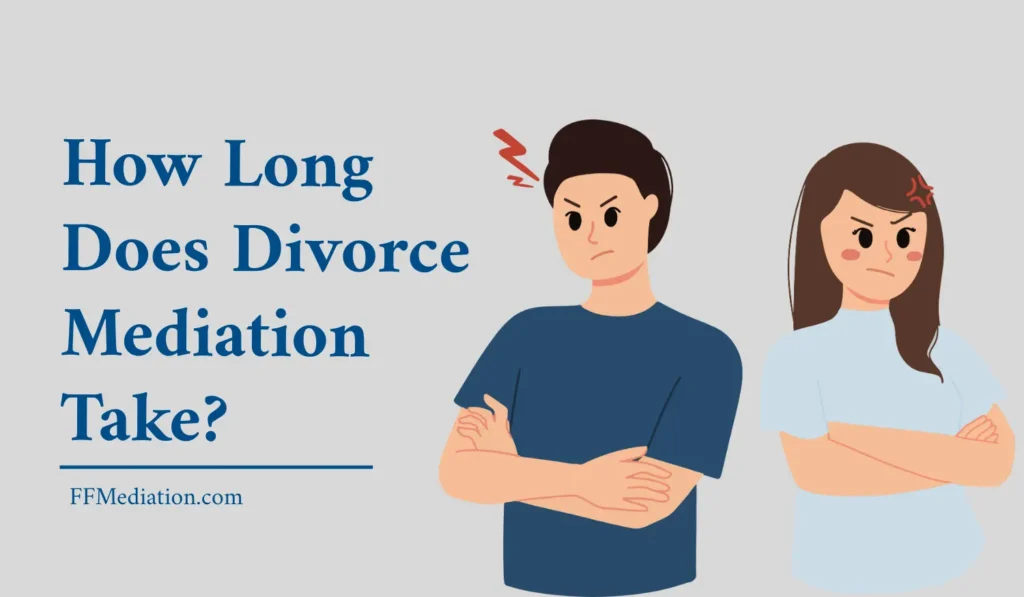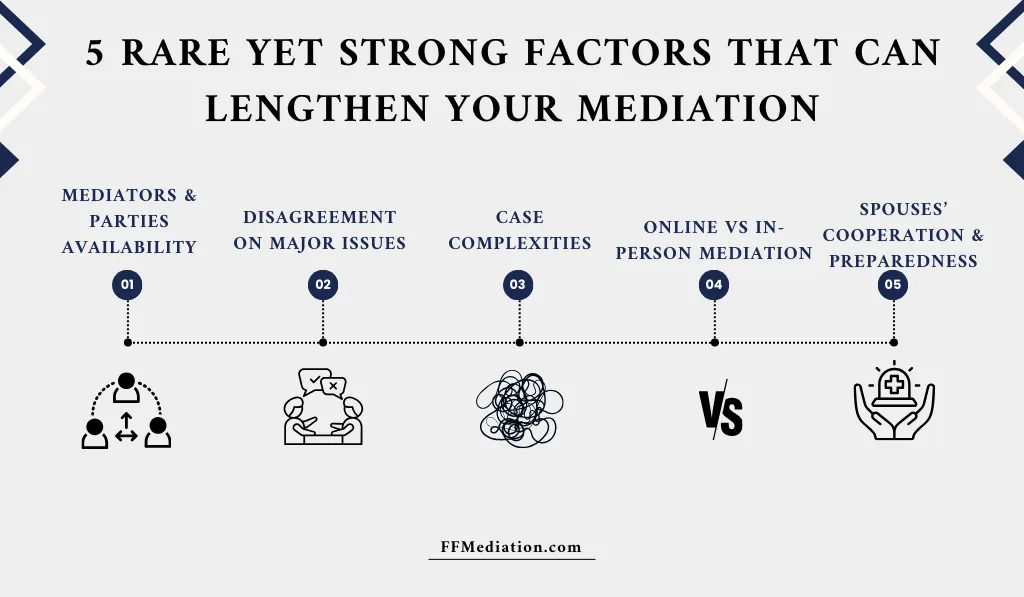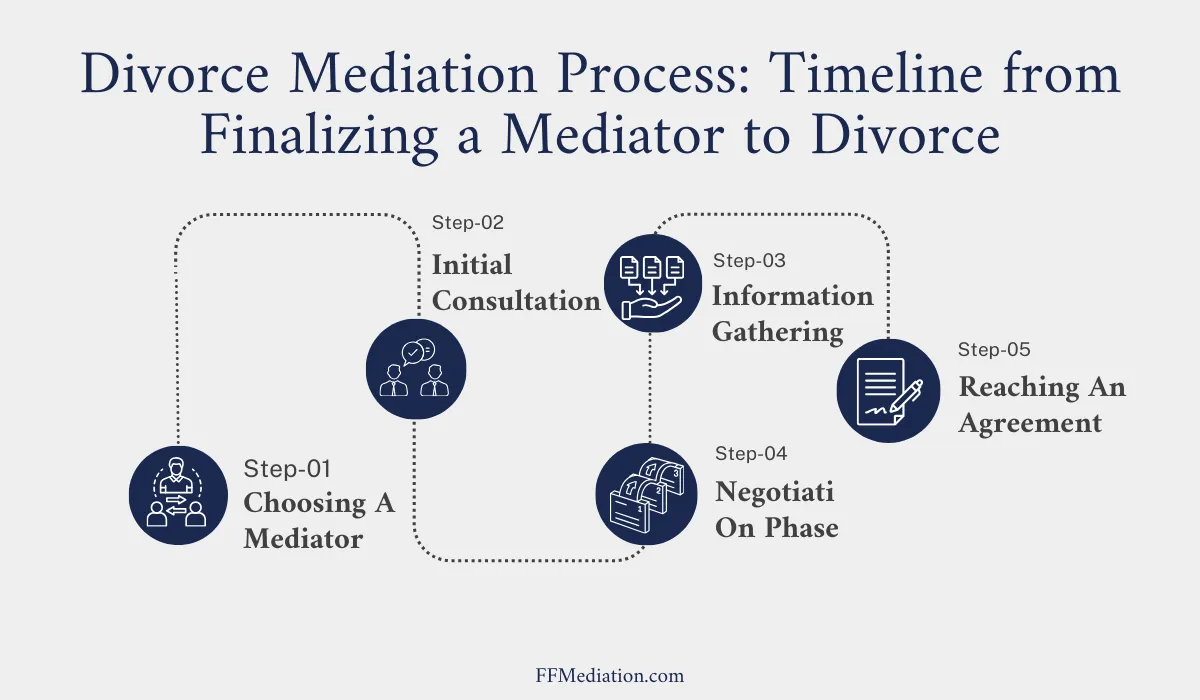Providing Divorce Mediation Services Throughout California
Providing Divorce Mediation Services Throughout California
Home » Divorce and Family law Blog » How Long Does Divorce Mediation Take in California?

Dina Haddad and her team provide expert mediation services for Californians. If you want help related to any family law issue, call us or book a consult.
Divorce Mediation in California can take 3 – 6 months for most cases, but in reality, this timeframe isn’t set in stone. It can take much longer if spouses refuse to cooperate, have complex issues, or the mediator has a tight schedule.
While you can have 70% control of how long mediated divorce takes – excluding mediator’s schedule – and you can reach agreements faster by being prepared, agreeing to cooperate, and hiring an available and expert mediator at Families First Mediation.
Simply put, divorce mediation is more time and cost-effective compared to divorce litigation and collaborative divorce and lets spouses control the final outcome. Take control of your divorce by booking a Free Divorce Mediation Consult with California’s expert attorney-mediator–Dina Haddad – to get started on your divorce today!
The divorce mediation in California is done by a neutral professional called a mediator who helps you and your spouse to resolve conflicts and make a final agreement without going to court. Unlike in divorce litigation where both parties have separate lawyers advocating for their needs, the mediator works for no one and everyone.
A mediator promotes communication and helps you obtain a mutually workable settlement. Many studies have shown that mediation can have better results, greater satisfaction, and less time to reach a settlement than litigated divorce and collaborative divorce.
Mediation can help you resolve important family law matters, such as:
Mediation also avoids time-consuming, costly court battles, allowing you to reach an outcome you want, instead of letting a judge or representative decide on your behalf.
Read More: Divorce Mediation vs. Collaborative Divorce: Which One Right for Me?
Private mediation in California typically takes about 3 to 6 months depending on complexity. It involves a neutral mediator helping you and your spouse voluntarily resolve issues.
Court-ordered mediation is forced by the courts and usually has shorter meetings (about 2 hours) but with limited scope and flexibility. One of the major disadvantages of court-ordered mediation is its rigidity and lack of individual attention, which can lead parties to prolong their dispute.
Most parties prefer private mediation with flexibility and control, confidentiality, and ability to tailor the mediation to conform to your situational needs, to reach faster and agreeable resolutions.
Mediation for divorce in California generally takes about four to six months (4–6) to be completed. Some cases take as little as eight to twelve weeks. The duration usually depends on how complicated the case is, availability of the mediators, and cooperation from both spouses.
Most divorces mediated under California law take place over three to six meetings, each meeting lasting about two hours.
Simple cases may only need two to four meetings , while complex or contested cases may require six to eight meetings or more. Preparation and cooperation during mediation will help in making every meeting productive and utilize time efficiently.
Each meditation session lasts around two hours. In the first session, you will get acquainted with the mediator, understand session rules, and outline the issues that need tackling.
Having more sessions will probably mean a longer mediation process, but if all parties are engaged and committed, the mediation can be concluded in fewer sessions.

Divorce mediation timelines depend on several key factors, and these include:
Mediators can become unavailable for a number of reasons, such as a full mediation calendar, conflicting availability, or emergencies.
Similarly, mediation can drag if one or both parties have busy schedules, which adds time for preparation and longer scheduling, and consistently delays meetings.
For example, if a mediator is consistently booked for at least a few weeks in advance and one spouse works non-standard hours, the mediation sessions may be spaced quite far apart during the negotiation process.
Fortunately, Dina Haddad offers an efficient online divorce mediation service in California to minimize waiting times and the length of your divorce proceedings. Book your free Divorce Mediation consultation to get started.
Disagreements on these complex and emotionally charged matters require more discussion, negotiation, and sessions, extending the timeline. Major issues in divorce that often prolong mediation include:
Case complexity requires substantial time for investigation, expert involvement, and negotiation, which lengthens mediation time overall. Complex cases with factors such as:
Online divorce mediation is typically faster because there is no travel time and scheduling is more flexible.
Online mediation is becoming more common in California. The in-person mediation session could take longer because of scheduling constraints, travel time or coordination. If the mediation has components that can be done online or in-person, both methods are appropriate. Online mediation is appropriate for people who desire convenience and speed.
The in-person mediation sessions may be more beneficial to parties who prefer face-to-face interaction but it usually takes longer.
Mediation runs much more smoothly when both spouses come prepared with documents, clear priorities and a mindset of cooperation.
Cooperation involves clear communication and a willingness to reach a compromise, while preparedness involves gathering financial information and understanding key issues.
The divorce mediation process happens in several distinct phases; each phase has a general timeline that, when combined with the others, will determine the length of the process as a whole.

Finding the best divorce mediator is an important part of the divorce mediation process. Couples generally take a couple of weeks, to find the right mediator, and they consider issues such as mediator’s experience, communication style, and whether the mediator will be neutral.
The initial consultation typically lasts up to 30 minutes. During the consultation, you meet the mediator, learn about the mediation process, discuss the issues in your divorce and determine whether mediation is appropriate.
This is a time to ask any questions and get a sense of what next steps you will take. Some mediators offer FREE consultation while others charge for it.
The next stage involves the collection of all relevant documentation, such as tax returns, property information, and other personal information.
This typically takes a week or two, depending on how quickly the parties can gather the relevant material. This is the first step to constructive negotiations.
This would be the true mediation process where the parties will meet, confer, read, and is the actual mediation process where the couples will convene and discuss, review, and negotiate all key components of their divorce, including the division of property and assets, child custody, and child and spousal support.
Negotiations typically last anywhere from a few weeks to several months, depending on the number of issues to work through and on the level of cooperation of the parties.
After the parties have agreed to all the terms of the agreement, your mediator will prepare a Marital Settlement Agreement. This could take anywhere from a few days to a few weeks a few days to a few weeks.
If you want to expedite the process, please carefully review the agreement and make comments or sign as soon as possible.
The timeline for divorce mediation in California varies based on the complexity of the issues and the unique requirements the judge sets in each case. Mediation can occur as quickly as 2-6 months out. After the parties reach a settlement, it typically takes 2-4 weeks to prepare and file the settlement documents with the court.
In California, the 6-month waiting period begins after the petition is served for divorce. In other words, while the parties may finish mediation in 2 months, they will not have completed their dissolution until they finish the 6-month waiting period.
After the petition is served, the court process can take another 1-3 months depending on backlogs as well as whether the parties effectively prepared the paperwork and documentation.
This mandatory waiting period starts from the time the divorce petition is officially served – not from the ending point of mediation. The waiting period is designed to give the parties ample time for reflection before making their decisions.
Note that you can finalize your divorce before this period expires, but your marital status will still be intact.
When the mediation process is finished, and you have a signed agreement, the mediator or your attorney will create the official Marital Settlement Agreement to file with the court. A judge will review and approve your contract. The approval process takes usually 1-3 months and can vary depending upon the county and court backlog.
During this time, it is important to always check that all of the sentencing paperwork is complete, and whenever the court requests something from you, respond quickly so that you are not causing unnecessary delays.
Learn More: Can You Get an Automatic Divorce in California after Long Separation?
In California, divorce mediation usually takes months to complete depending on the level of complexity of the case and cooperation from your spouse. To speed up the process and the most important limit the cost, prepare yourself, cooperate with your spouse, pick the right mediator, and consider virtual mediation.
Schedule your FREE Divorce Mediation consultation with Families First Mediation experienced mediators today!
The length of divorce mediation is usually 2 – 6 months, and can vary based on the issues present in the case and the cooperation of the parties.
Divorce mediation also generally will take much less time to come to an agreement than litigation that can take years simply because litigation is more focused on fighting the other party rather than directly negotiating.
Mediation is not a good option in a case with significant hostility and/or abuse between spouses. Mediation requires engagement and cooperation between the parties.
Mediation also does not guarantee resolution of all issues; sometimes, mediation is used prior to one party bringing an action in divorce court.
The State uses a complicated mathematical formula that takes into consideration various factors, including the amount of time spent parenting, the costs of health insurance, and legally mandated payroll deductions, to determine child support payments.
A normal mediation session should take two hours to complete, and the process could take several months. As mentioned earlier, the actual duration totally depends on the situation and what your mediator recommends.
No, mediation is often the step before formal litigation with the intent for the parties to settle without going to court. If mediation fails, the parties can go to trial.
Approximately 70% to 80% of divorce mediation results in a successful resolution without needing to enter a courtroom for trial. What makes mediation success, besides the mediator’s skills, is you and your partner’s willingness to negotiate and reach an agreement. Without this important ingredient, mediation will have no effect.
In the cases of domestic violence, an extreme imbalance of power, or if one party is flat out refusing to negotiate in good faith. In such a situation, trying other options like attorney led mediation, settlement conferences or litigation.